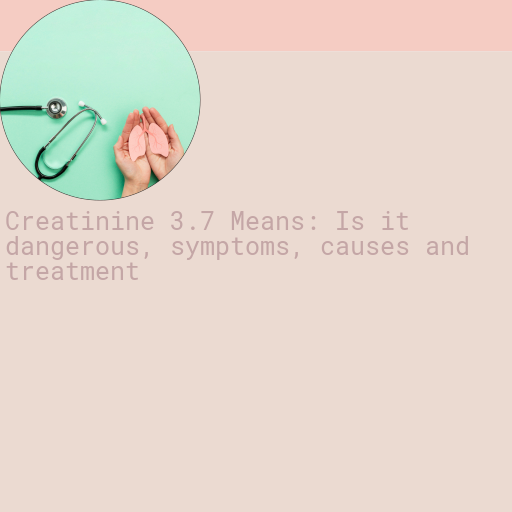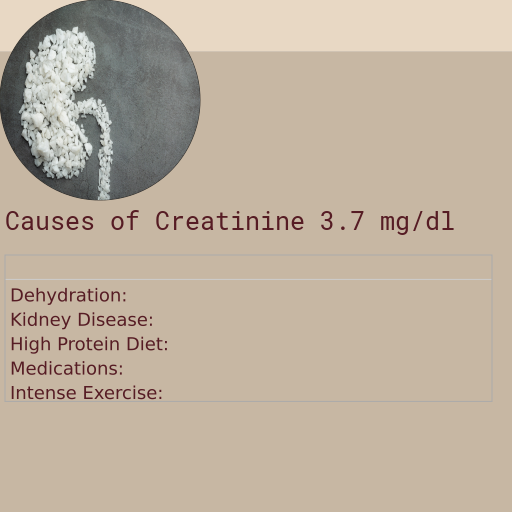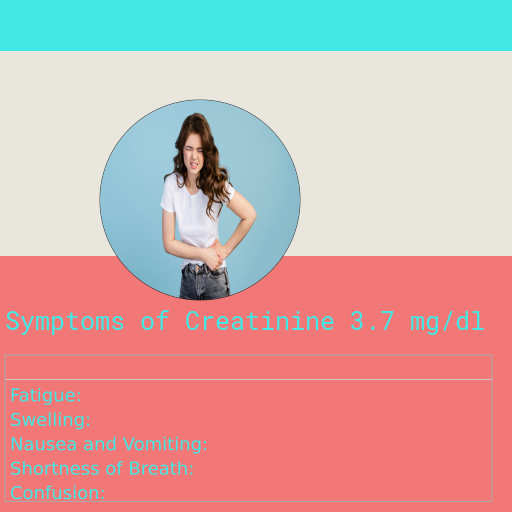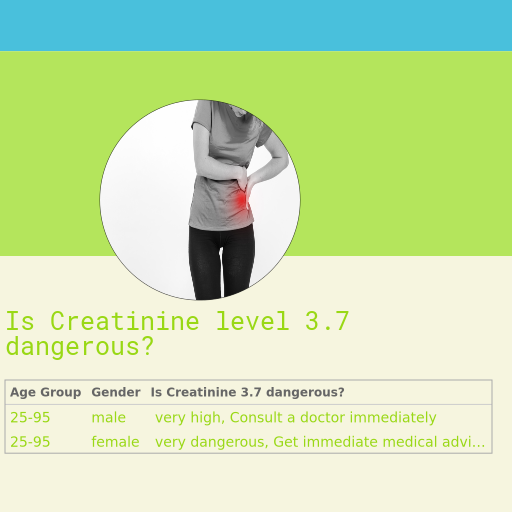Creatinine 3.7 : Is it Dangerous, Causes, Symptoms and More
Understanding the implications of elevated creatinine levels is crucial for maintaining kidney health. An increase in creatinine can be a significant indicator of underlying health issues. When creatinine levels reach 3.7, it often signals that the kidneys are not functioning optimally. This can be a cause for concern, as the kidneys play a vital role in filtering waste from the blood. Various factors can lead to elevated creatinine levels, including chronic kidney disease, dehydration, and certain medications. Recognizing the symptoms and identifying the causes early on can be pivotal in managing and treating the condition effectively.

What is Creatinine
Creatinine is a byproduct of the natural breakdown of muscle tissue and protein metabolism in the body. As a waste product, it is filtered out of the blood by the kidneys and excreted in the urine. Unlike nutrients and essential compounds, creatinine has no use in the body and must be efficiently removed to maintain healthy kidney function. Elevated levels of creatinine in the blood can indicate potential kidney dysfunction, making it crucial to monitor and address any significant changes in its concentration.
- Muscle Metabolism: Creatinine is a waste product generated from the normal wear and tear of muscles in the body.
- Dietary Intake: Consuming meat and other animal products can contribute to the levels of creatinine in the blood.
- Creatine Supplements: Individuals who take creatine supplements for athletic performance or bodybuilding may have elevated creatinine levels.
- Kidney Function: The kidneys filter creatinine from the blood, so any dysfunction in the kidneys can affect creatinine levels.
- Body Mass: People with higher muscle mass tend to have higher baseline creatinine levels due to increased muscle metabolism.
- Medications: Certain medications can influence creatinine levels, either by affecting kidney function or through direct chemical interaction.
- Hydration Status: Dehydration can lead to a concentration of creatinine in the blood, thus appearing as higher levels.
Normal Range of Creatinine in Adults
The normal range of creatinine levels in adults can vary depending on factors such as age, sex, and muscle mass. Generally, for adult males, the typical range is around 0.6 to 1.2 milligrams per deciliter (mg/dL), while for adult females, it is approximately 0.5 to 1.1 mg/dL. These values indicate a healthy kidney function, as creatinine is a waste product filtered out of the blood by the kidneys. Levels outside of this range may indicate a potential issue with kidney function and warrant further medical evaluation.
| Age Group | Normal Creatinine Range (mg/dL) |
|---|---|
| Infants (0-1 year) | 0.2 - 0.5 |
| Children (1-12 years) | 0.3 - 0.7 |
| Teens (13-18 years) | 0.5 - 1.0 |
| Adult Males | 0.6 - 1.2 |
| Adult Females | 0.5 - 1.1 |
| Older Adults (60+ years) | 0.7 - 1.3 |
Causes of Creatinine 3.7
Elevated creatinine levels can be a significant health concern, often indicating underlying issues with kidney function. There are various causes for increased creatinine, ranging from chronic kidney disease to acute kidney injuries. Other contributing factors may include dehydration, certain medications, and conditions like diabetes or high blood pressure. Understanding these causes is crucial for early detection and effective management of potential kidney problems.
- Dehydration: Insufficient fluid intake can lead to a higher concentration of creatinine in the blood.
- Kidney Disease: Chronic kidney disease or acute kidney injury can impair the kidneys' ability to filter waste, leading to elevated creatinine levels.
- High Protein Diet: Consuming a diet rich in protein can increase creatinine levels as protein metabolism produces creatinine.
- Medications: Certain drugs such as nonsteroidal anti-inflammatory drugs (NSAIDs), ACE inhibitors, and some antibiotics can impact kidney function and raise creatinine levels.
- Intense Exercise: Vigorous physical activity can cause muscle breakdown, releasing more creatinine into the bloodstream.
- Diabetes: Poorly controlled diabetes can lead to kidney damage over time, affecting creatinine levels.
- High Blood Pressure: Hypertension can damage the blood vessels in the kidneys, impairing their ability to filter blood effectively.
- Urinary Tract Obstruction: Conditions like kidney stones or an enlarged prostate can block urine flow, leading to increased creatinine levels.

Symptoms of Creatinine 3.7
Elevated creatinine levels in the blood can be a red flag for underlying health issues, particularly related to the kidneys. Recognizing the symptoms associated with high creatinine is crucial for early diagnosis and treatment. Common signs may include fatigue, swelling in the ankles and feet, shortness of breath, and changes in urination patterns. Being aware of these symptoms can help you seek timely medical advice and prevent potential complications. Understanding the significance of these indicators can empower you to take proactive steps in managing your health effectively.
- Fatigue: Feeling unusually tired or weak can be a symptom of elevated creatinine levels.
- Swelling: Excess fluid in the body can cause swelling in the face, hands, feet, or ankles.
- Nausea and Vomiting: Feeling sick to your stomach or vomiting can be a sign of kidney issues.
- Shortness of Breath: Difficulty breathing may occur if excess fluid builds up in the lungs.
- Confusion: High creatinine levels can affect mental clarity and lead to confusion or difficulty concentrating.
- High Blood Pressure: Elevated creatinine can be associated with high blood pressure.
- Changes in Urine Output: Noticeable changes in the frequency or amount of urine can indicate kidney problems.
- Muscle Cramps: Painful muscle cramps, particularly in the legs, can occur with elevated creatinine levels.

Dangers of Creatinine 3.7
Creatinine, a waste product produced by muscle metabolism, is not harmful to the body by itself. However, when creatinine levels are elevated, it often signals underlying issues such as kidney failure or other serious conditions. The primary concern with high creatinine levels is that they indicate the kidneys are not functioning properly, which can lead to the accumulation of other toxic waste products like urea in the bloodstream. These waste products can have severe ill effects on the body, including nausea, fatigue, and more serious complications if left untreated.
- Kidneys: High creatinine levels can indicate kidney dysfunction or damage, which impairs the kidneys' ability to filter waste effectively.
- Heart: Elevated creatinine can be a sign of cardiovascular problems, potentially leading to heart disease or heart failure.
- Liver: Although less common, high creatinine may suggest liver disease, as the liver plays a role in maintaining overall metabolic balance.
- Muscles: Increased creatinine can result from muscle breakdown or disorders, as creatinine is a byproduct of muscle metabolism.
- Lungs: High levels might be associated with respiratory issues, as the body's demand for oxygen and waste removal is compromised.
- Gastrointestinal Tract: Elevated creatinine can lead to digestive problems such as nausea, vomiting, and loss of appetite.
- Nervous System: Increased creatinine levels can affect the nervous system, causing symptoms like confusion or seizures in severe cases.
- Skin: High creatinine can result in skin changes such as itching or dryness due to the build-up of waste products in the body.
Home remedies for Creatinine 3.7
Disclaimer: Elevated creatinine levels are a serious medical issue that cannot be effectively treated at home. It is crucial to seek professional medical advice and treatment. Basic supportive care at home may include staying hydrated, maintaining a balanced diet, and avoiding strenuous activities that can further stress the kidneys. However, these measures should only be considered as complementary to the treatment plan provided by a healthcare professional. Always consult with a doctor to understand the underlying cause and appropriate treatment for elevated creatinine levels.
- Stay Hydrated: Drinking plenty of water can help your kidneys function more effectively and may reduce creatinine levels.
- Limit Protein Intake: Reducing the amount of protein in your diet can lessen the workload on your kidneys, potentially lowering creatinine levels.
- Monitor Blood Pressure: Keeping your blood pressure in check is crucial, as high blood pressure can worsen kidney function.
- Avoid Over-the-Counter Painkillers: Medications like ibuprofen and aspirin can harm your kidneys, so use them sparingly or consult your doctor for alternatives.
- Adopt a Kidney-Friendly Diet: Focus on eating fruits, vegetables, and whole grains while avoiding foods high in potassium, phosphorus, and sodium.
Treatment for Creatinine 3.7
When creatinine levels reach 3.7, seeking medical treatment by a doctor is crucial. The primary treatment goals include stabilizing kidney function to prevent further deterioration, discontinuing any harmful drugs that may contribute to the elevated creatinine levels, and addressing any underlying infections that might be affecting kidney health. Early intervention and a comprehensive treatment plan can significantly improve outcomes and help manage the condition effectively.
- Medication Adjustment: Doctors may prescribe medications that help lower creatinine levels and improve kidney function. It's crucial to follow the prescribed dosage and schedule.
- Dietary Changes: Implementing a kidney-friendly diet can significantly impact creatinine levels. Reducing protein intake, limiting salt, and avoiding foods high in phosphorus and potassium are often recommended.
- Hydration: Staying well-hydrated can help the kidneys function more efficiently. Drinking an adequate amount of water daily is essential, but it's important to consult a doctor about the appropriate amount.
- Manage Underlying Conditions: Conditions like diabetes and hypertension can exacerbate kidney issues. Proper management of these conditions through medication, lifestyle changes, and regular monitoring is vital.
- Dialysis: In severe cases, where creatinine levels are extremely high and kidney function is critically low, dialysis may be necessary to remove waste products from the blood.
GFR with Creatinine of 3.7
The Glomerular Filtration Rate (GFR) is a critical measure of kidney function that gauges how well your kidneys are filtering blood. While the absolute value of creatinine in your blood provides some insight, it is not as comprehensive as the GFR. This is because creatinine levels can be influenced by various factors such as muscle mass, diet, and age. In contrast, the GFR accounts for these variables, offering a more accurate assessment of kidney health. Therefore, medical professionals often prioritize GFR over creatinine levels when diagnosing and treating kidney conditions, as it provides a clearer picture of how well your kidneys are performing their essential functions.
| Grade of GFR | GFR Range (mL/min/1.73m2) | Kidney Function | Description |
|---|---|---|---|
| G1 | ≥ 90 | Normal or High | Kidney function is normal. No kidney disease is present. |
| G2 | 60-89 | Mildly Decreased | Kidney function is slightly reduced. Typically, no symptoms are present, and this stage is often detected through routine blood tests. |
| G3a | 45-59 | Mild to Moderate Decrease | Some kidney damage is present. Symptoms like mild fatigue and swelling of the legs may occur. |
| G3b | 30-44 | Moderate to Severe Decrease | More significant kidney damage. Symptoms such as fatigue, swelling, and changes in urination may become more apparent. |
| G4 | 15-29 | Severely Decreased | Severe kidney damage. Symptoms are more pronounced and may include severe fatigue, nausea, and fluid retention. |
| G5 | < 15 | Kidney Failure | Kidney failure or end-stage renal disease (ESRD). Dialysis or a kidney transplant is required to sustain life. |
What is my GFR for a creatinine of 3.7
| Age | Gender | GFR |
|---|---|---|
| 18 | male | 21.5 ml/m2 |
| 45 | male | 17.85 ml/m2 |
| 60 | male | 16.84 ml/m2 |
| 80 | male | 15.89 ml/m2 |
| 18 | female | 15.96 ml/m2 |
| 45 | female | 13.25 ml/m2 |
| 60 | female | 12.5 ml/m2 |
| 80 | female | 11.79 ml/m2 |
Table of danger posed by Creatinine 3.7 in male across different ages
| Age Group | Is Creatinne of 3.7 dangerous? |
|---|---|
| 25yrs - 95 yrs | very high, Consult a doctor immediately |
Table of danger posed by Creatinine 3.7 in female across different ages
| Age Group | Is Creatinne of 3.7 dangerous? |
|---|---|
| 25yrs - 95 yrs | very dangerous, Get immediate medical advice and treatment. |

Which other tests should be done for a creatinine value of 3.7?
In addition to measuring creatinine levels, healthcare providers often recommend a series of other tests to get a comprehensive view of kidney function and overall health. These may include tests for electrolytes, which help assess the balance of essential minerals like sodium, potassium, and calcium in your blood. A renal profile is another crucial test, offering insights into various waste products and how well your kidneys are filtering them. Additionally, testing blood gas levels can provide critical information about how well your lungs and kidneys are balancing oxygen and carbon dioxide in your bloodstream. Together, these tests can help paint a fuller picture of your health, guiding effective treatment plans.
- Electrolytes: Monitoring electrolyte levels such as sodium, potassium, calcium, and magnesium is crucial. Abnormalities can indicate kidney dysfunction or other underlying conditions.
- Renal Profile: A comprehensive renal profile includes tests like blood urea nitrogen (BUN) and serum creatinine. This helps in assessing overall kidney function and identifying any renal impairment.
- Blood Gas Levels: Arterial blood gas (ABG) tests measure the levels of oxygen and carbon dioxide in the blood. This is essential to determine how well the lungs are functioning and to detect any metabolic imbalances.
- HbA1c: Glycated hemoglobin (HbA1c) levels provide an average blood glucose level over the past few months. This test is particularly important for diabetic patients, as high levels can exacerbate kidney issues.
- Liver Enzymes: Tests like ALT, AST, and ALP measure liver enzyme levels. Elevated levels can indicate liver damage or disease, which can have a significant impact on overall health and kidney function.

 By: Dr.Bhargav Raut
By: Dr.Bhargav Raut